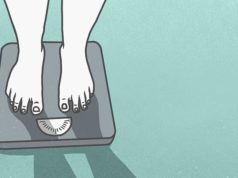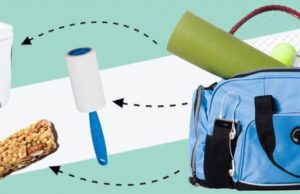There's a reason the word "diet" is met with such animosity. Most of us declare Day 1 of a new, healthier eating plan with motivation and determination, but tend to lose steam for one reason or another. And while the idea of permanently overhauling your diet may seem hopeless, knowing the exact reason that your healthy eating plan failed can actually help you stick to one in the future, because you know what landmines to look out for.
To help you navigate pretty much any diet trap that may come your way, we've gathered advice from Judith S. Beck, Ph.D., president of Beck Institute for Cognitive Behavior Therapy and Deborah Beck Busis, coordinator of the Beck Institute Diet Program, co-authors of the just-released The Diet Trap Solution: Train Your Brain to Lose Weight and Keep It Off for Good. Check out 16 of the most common traps people fall into on a diet, and-more importantly-how to avoid falling off the wagon when find yourself facing one of them.
The Too Busy Trap
The feeling: Your life is so stressful you either don't have time to work on healthy eating, or think healthy eating will make you more stressed.
The solution: Focus on a healthy meal plan. "Staying in control of eating during busy times helps you feel more in control in general-which actually reduces your stress," she explains. Losing control can increase your anxiety, so prioritize activities like meal planning and grocery shopping. "You will have busy times for the rest of your life, so you need to learn the skill of making healthy eating a top priority," she adds.
The Entitlement Eating Trap
The feeling: You believe you deserve to comfort yourself with food.
The solution: A typical sabotaging thought of dieters is: "I'm upset; I deserve to comfort myself with food." Food can be an immediate comfort, but when you're finished eating, you still have the problem that upset you in the first place and now you feel badly for having gotten off track (not to mention queasy from one too many Cheetos). A healthier solution? Hit the gym or pound those emotions out on the pavement. (And try these Surprising Ways to Slim Down Comfort Food Favorites.)
The Killing Time Trap
The feeling: You turn to food when you're bored, tired, or procrastinating.
The solution: When you want to reach for a snack, ask yourself where the urge to eat is coming from. If there's actually an empty, rumbling sensation in your stomach, you're probably actually hungry. But more often than not, you're responding to physiological cues in your mouths, throats, or upper body-which means you're not hungry but just have an urge to eat. And if it's not actually hunger, ask yourself what it is you really need-since it's not food. Recognition is the hard part-the solution is simple: If you're bored, find a way to entertain yourself. If you're tired, sleep or a break for a brisk walk. If you're procrastinating, get started already!
The Buzz Kill Trap
The feeling: You feel responsible for making others feel better about what they're eating or drinking.
The solution: Dieters sometimes think if they pass on the cheesy dip or sugary cocktails, it'll put a damper on everyone else's experience. But it's not your responsibility to make others feel better about what they consume. Think of it this way: If you had a severe peanut allergy and you would feel completely entitled to pass on the peanut butter cookies everyone else was indulging in, no matter how disappointed anyone else might be. Losing weight and being happier and healthier are completely legitimate reasons to eat in a healthy way, no matter how other people might feel about it.
The Willing Accomplice Trap
The feeling: You don't put up much of a fight because, truthfully, you want to eat.
The solution: "I have to eat a second piece of my aunt's apple pie because she'll be too disappointed if I don't." Sure, your aunt may be a food pusher, but will she really be disappointed-or would you just be happier serving up seconds? In order to be firm with pushy people, you have to first to be firm with yourself. Having a solid eating plan before you go into a situation will make it easier to navigate the diet landmines. And learn the art of being nicely assertive: Usually, repeatedly saying, "No, thank you," without necessarily offering any explanation, is the best way to dodge a food pusher's guilty.
The Rebel Trap
The feeling: You revert to old (and unhealthy) behaviors when interacting with your family.
The solution: A lot of dieters come from a background of unhealthy habits-whether it's permission to eat junk guilt-free or criticism for even thinking of indulging. As adults, being around family can trigger old habits, like sneaking food or overeating. Speak assertively with your family, asking them to forgo making any comments about the way you look or eat. And, while you may love mom's doting, remember that you are an adult and completely in control of their own eating. If you overeat with family, the only person you're hurting is yourself.
The Can’t-Deprive-the-Family Trap
The feeling: You don't keep tempting foods at home because you don't want your family to "suffer."
The solution: Some people use their family as an excuse to buy whatever they themselves actually want, and some truly do believe their family will suffer if they ban the tempting potato chips and ice cream. If you fall into the first, it's time to 'fess up and nix the habit. For the second, though, ask your husband to buy himself single-sized servings of treats, and if your kids have to have something salty in their lunch, buy them the single-serving bags so you're less tempted.
The 24/7 Treat Trap
The feeling: You think every meal out should be special (even though you eat out all the time).
The solution: If you're eating out once or twice a week, it's reasonable to plan in advance to eat a little more (but be careful-restaurants often load food with butter and oil to make it tastier). Splurging whenever you go out, though, is a recipe for diet disaster. Instead of celebrating with calories, focus on the other pleasurable aspects of eating out: The food is prepared and served by someone else; you have no kitchen clean up; and you get to really focus on the people you're dining with. As for what to order, Just Decode the Menu.
Limited Food Options Trap
The feeling: You don't have control over your food while traveling.
The solution: Yes, staying healthy on a trip is hard. But relinquishing all control just because you don't have your blender for smoothies or fridge for yogurt is self-sabotage. It's all about preparation: Bring snacks with you, get to the airport in time to find a healthy meal, call the hotel ahead of time and request a mini fridge, then stop by a convenience store on your way and fill up with healthy perishables. If you're staying with friends, you may not have control over what is served for dinner, but you do have control over portions and caloric optional toppings. (And try to squeeze in workouts to keep your motivation up with these 9 Clever Ways To Make Your Vacation Healthier.)
The Wall-to-Wall Treats Trap
The feeling: You can't avoid free treats in the office kitchen.
The solution: Whether it's the holidays, birthdays, or just Bagel Wednesdays, the proliferation of treats in the office can be a dieter's downfall. Having a firm plan can help. "No treats ever" is probably not realistic-especially around the holidays when it seems a different person brings in Christmas cookies every day. Give yourself one free pass a week, and even consider wrapping a treat up and bringing it home to eat after dinner if you still want it. If you have a hard time avoiding the free sweets, try this: Write the answer to "What do you wish you could remember when you're tempted?" on a card, and read it before going to the kitchen. (Also try keeping these 5 Office-Friendly Snacks That Banish the Afternoon Slump in your top drawer.)
The Big Day
The feeling: You overeat on a holiday.
The solution: Some people truly believe if they don't get to eat whatever they want, they won't be able to enjoy the holiday. But there is a huge difference between not getting to eating anything you want and eating everything you want. In fact, overeating can actually ruin the holiday because you become self-critical after going overboard. Aim for small to moderate portions of a few favorite foods, and skip on the stuff you can get year-round. (Also try these 6 Last-Ditch Holiday Diet Tips.)
The Deprivation Trap
The feeling: You feel resentful for having to restrict what you eat.
The solution: There's a trap of thinking, "It's so unfair; I should be able to eat anything I want. Life's not worth living if you can't enjoy good food." You have a choice, though: You can eat everything you want, whenever you want-or you can keep the weight off and feel healthy. You can't have it both ways. And feeling deprived is really a state of mind. Restricting yourself under the mindset of missing out will just make you feel worse. But sticking to carrots most of the night will keep your mood up, and help you truly enjoy the dessert when you decide to indulge.
The Feeling Overburdened Trap
The feeling: You get tired of focusing on and putting effort into weight loss.
The solution: If you've been trying to stay on track (and continually falling off) for years, the effort that goes into losing weight will eventually get to you. But being overweight, unable to run at the speed you want, or feeling down on your self is burdensome too. And not just emotionally: Being overweight comes at the cost of greater medical expenses. Losing weight can be hard, but not constantly dreaming after a body and health bill you don't currently have is even more exhausting. Plus, while you may be feeling apathetic now, you'll definitely care tomorrow about the decision to break or not right now. It's important to push past moments of brief apathy and remind yourself why you set this goal for yourself in the first place.
The I’ve-Blown-It Trap
The feeling: You tell yourself you will get back on track tomorrow.
The solution: Probably the most common-and most sabotaging thought-our experts hear is, "I've already blown it for the day. I might as well keep eating whatever I want and get back on track tomorrow." In almost no other area of life do we think it makes sense to compound one mistake with another-if you were driving and missed your exit, would you think, "Well, I've blown this trip now," and drive five more hours in the wrong direction? No, you'd immediately turn around and head back to the path you set out on. The problem in dieting arises when you use one mistake as an excuse to keep making more. Mistakes are unavoidable. Be prepared for that in advance, and when you slip up, just say to yourself, "Okay, I made a mistake. It's not a big deal. I'll just get back on track right this minute."
The Stuck Off-Track Trap
The feeling: You have a tough time restarting your diet after you've gotten off track.
The solution: The hardest part of any change is starting-or restarting. Once you're on track and have positive momentum built up, dieting gets so much easier. You just have to push past the initial hump to make it to the smooth ride. Once you're in control, you'll never question whether or not it's worth it because they feel so good-so why would you question this before you begin?
The All-or-Nothing Thinking Trap
The feeling: You have to give up all your favorite foods to adhere to a diet.
The solution: When you have a strong concept of "good" foods and "bad" foods, it puts you at risk for getting off-and staying off-track. Often dieters consider foods they really love to be "bad" foods and try to stay away from them entirely. As we all know, though, this doesn't work long term because sometimes nothing can satisfy that chocolate cake craving like, well, a slice of chocolate cake. Rewrite what you know and lean into this feeling-eat at least one favorite food a week from your "bad" list. Knowing you have a free pass coming up will make it easier to pass on treats during the week, and not completely cutting yourself off will help you avoid falling off the wagon entirely and losing that positive momentum.











